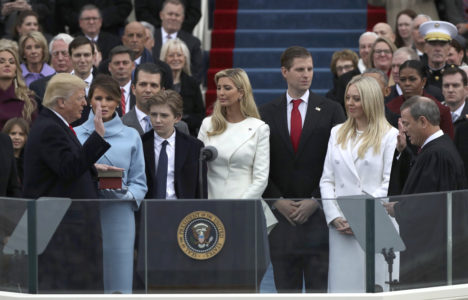
U.S. President Donald Trump places his hand on the Bible as he takes the oath of office administered by U.S. Chief Justice John Roberts Jan. 20. At Trump’s side are his wife, Melania, and children Barron, Donald, Ivanka, Eric and Tiffany during his swearing-in as the country’s 45th president at the U.S. Capitol in Washington. (CNS photo/Carlos Barria, Reuters) See INAUGURATION- Jan. 20, 2017.
By Cindy Wooden
VATICAN CITY (CNS) – As President Donald Trump was being sworn in, Pope Francis told an interviewer it would be “reckless” to pass judgment on the new president before he had a chance to do anything.
“We must wait and see,” the pope told two reporters from the Spanish newspaper El Pais during a 75-minute interview Jan. 19.
The interview was published late Jan. 20 in its original Spanish with an English translation.
Asked if he wasn’t worried at least about some of the things Trump said before his election, the pope responded, “I’m waiting. God waited so long for me, with all my sins.”
“Being afraid or rejoicing beforehand because of something that might happen is, in my view, quite reckless,” the pope said. “We will see. We will see what he does and then we will judge always on the concrete. Christianity either is concrete or it is not Christianity.”
El Pais asked another question about Trump and populists in the United States and Europe who, the interviewer said, “capitalize on fear in the face of an uncertain future in order to form a message full of xenophobia and hatred toward the foreigner.”
“Crises provoke fear, alarm,” the pope said. “In my opinion, the most obvious example of European populism is Germany in 1933. After (Paul von) Hindenburg, after the crisis of 1930, Germany is broken, it needs to get up, to find its identity, a leader, someone capable of restoring its character, and there is a young man named Adolf Hitler who says: ‘I can, I can.'”
“Hitler didn’t steal the power, his people voted for him, and then he destroyed his people,” Pope Francis said.
In times of crisis, he said, large segments of the population think, “Let’s look for a savior who gives us back our identity and let’s defend ourselves with walls, barbed-wire, whatever, from other peoples who may rob us of our identity. And that is a very serious thing.”
Obviously, Pope Francis said, nations have a right and duty to control their borders, especially under the threat of terrorism, but “no country has the right to deprive its citizens of the possibility of talking with their neighbors.”
